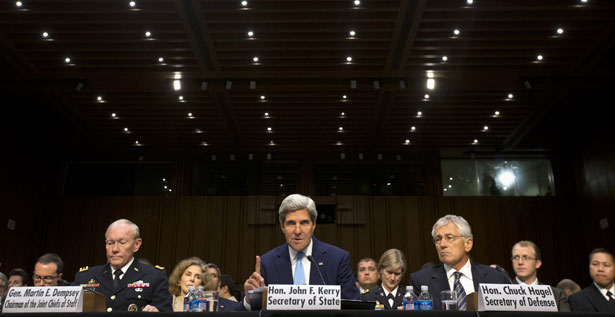
Secretary of State John Kerry, center, testifies on Capitol Hill in Washington, Tuesday, September 3, 2013, during a Senate Foreign Relations Committee hearing on Syria. (AP Photo/Jacquelyn Martin)
The Senate Foreign Relations Committee voted yesterday to authorize the use of force in Syria, sending a resolution full of broad, imprecise language on to the full Senate. The committee split 10-7, with Democrats Chris Murphy and Tom Udall and Republican presidential hopefuls Rand Paul and Marco Rubio among those voting against the authorization.
The resolution is in some respects narrower than what the administration proposed, but it retains a number of loopholes. While it gives the president the power to use the armed forces only within Syria, and “in a limited and specified manner against legitimate military targets,” the president reserves the ability to determine what constitutes “limited” and “legitimate.”
The resolution authorizes the president to use force not only for the purposes of deterring and degrading Assad’s ability to launch future chemical attacks, but also to prevent the transfer of chemical weapons to terrorists, to non-state actors within Syria or to another state. While the transfer of chemical weapons is a legitimate concern, that language broadens the scope of the authorization well beyond what the administration claims to be the intention of the strikes.
The resolution appears to prohibit “boots on the ground,” a priority for lawmakers wary of deeper entanglement. But at closer inspection, that limitation is hollow. The resolution states that it “does not authorize the use the United States Armed Forces on the ground in Syria for the purpose of combat operations.” It says nothing about the use of Special Forces, which may already be engaged in Syria, and it would permit the deployment of ground troops for purposes other than “combat operations.”
The ultimate problem with the limitation on boots on the ground is that no language can control how the Syrian government or its allies will respond to American airstrikes. Initiating military action in Syria, however limited, invites a response that could escalate the conflict to an extent that effectively forces the United States to introduce ground troops. If US allies or American personnel were directly targeted, it would be nearly impossible to limit the scale of US involvement.
I wrote yesterday about the last “whereas” clause in the draft resolution (preserved in the final version), which offers a shockingly broad interpretation of executive war power, particularly in combination with other “whereas” clauses in the authorization. The resolution makes the claim that the “the President has authority under the Constitution to use force in order to defend the national security interests of the United States.” What constitutes national security interests, and who decides when they are threatened? According to previous clauses, “Syria’s acquisition of weapons of mass destruction” and “Syria’s use of weapons of mass destruction and its conduct and actions” both threaten “the national security interests of the United States.”
It would appear then that the Foreign Relations Committee agrees with the administration’s claim that it does not need congressional authorization to initiate military strikes. Furthermore, the broadened constitutional authority that the resolution acknowledges is not limited to Syria, and so could be abused by an executive in future decisions regarding the use of force. While the “whereas” clause is essentially meaningless in terms of the practical application of the resolution, it does send a troubling signal about how much constitutional power Congress is willing to cede to the executive branch. As Jack Goldsmith, formerly assistant attorney general in the Office of Legal Council and now a Harvard law professor, wrote yesterday, the authorization “gives significant support to the position that the President has some (uncertain) independent constitutional authority to use force in Syria, regardless of what Congress authorizes, and (perhaps) beyond what Congress authorizes.”
Senator Rand Paul introduced an amendment clarifying the constitutional limits on the president’s authority to act unilaterally, but it failed to win approval from the committee. Two amendments, proposed by John McCain and Chris Coons, were added by voice vote; they assert that official US policy is “to change the momentum on the battlefield in Syria” in a way that “leads to a democratic government,” and that US strategy should aim to upgrade the capacity of “vetted elements” of the opposition.
The Obama administration commended the passage of the authorization, as it should. The resolution is well “tailored” to fit its agenda.
![]() Take Action: Demand Your Reps Vote No on Military Intervention in Syria
Take Action: Demand Your Reps Vote No on Military Intervention in Syria


